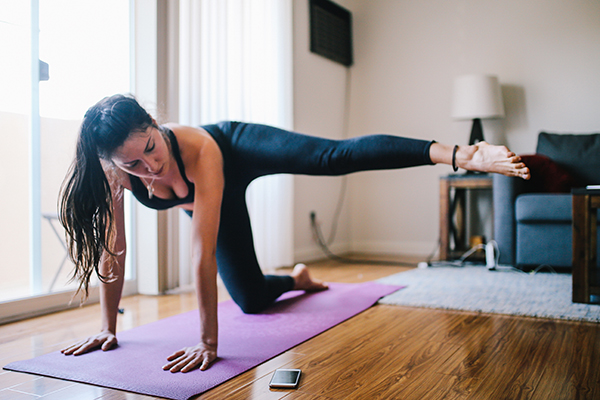12 Ways You Can Reduce Stress Now

Stress can manifest in so many different ways: a tense jaw, hunched shoulders, and mild anxiety on the more manageable end of the spectrum, weight fluctuations, fatigue, and mood swings on the more formidable end.
The causes of stress can be even more assorted and complex, from real and perceived threats to the use of substances like alcohol, caffeine, and nicotine, and even hormone imbalances like those associated with cortisol.
Known as the stress hormone, cortisol activates in response to these stressors. Once adrenaline is discharged to prepare the body for a threat, cortisol orders the release of blood sugar to fuel the response. But constant stress can beget constant cortisol, throwing levels out of balance and contributing to long-term health problems that negatively affect sleep, weight maintenance, and a host of other functions.
With some effort, you can reduce stress and restore balance not only on a daily basis but even at a physical level. Read on for a dozen simple tips and relaxation techniques to help get relief from daily stress.
1. Breathe
There’s the kind of inhaling and exhaling you do unconsciously to keep from fainting — and then there’s breathing, an intentional effort to focus on the physical and mental process of consuming oxygen, which is the essential element of energy production in the body.
Breath work is increasingly recommended for stress management and entails paying conscious attention to the source, depth, pace, and passageways involved in respiration. Recent studies have found it effective for improving stress and mental health, and at helping reduce cortisol.
There are a variety of breathing techniques you can try in pursuit of the one that works best for you. Belly breathing, box breathing, and 4-7-8 breathing are just a few that can help you positively cope with stress.
2. Sweat It Out

Research shows that when you exercise, your levels of stress decrease. The reasons are manifold, including an increase in happy hormones, a reduction in stress hormones, and improvements in sleep.
One recent study found a decrease in cortisol among participants who exercised for 30 minutes at moderate- to high-intensity, while others have found physical activity to prompt the release of “feel-good” endorphins.
Researchers point out that both a regular exercise routine and one-off workouts contribute to lower levels of stress, so get moving!
At home? Try a streaming workout that you can do right in your living room. Prefer to get outside? Go for a guided run.
3. Check In With Your Body
Take a few moments throughout your day to take stock of how your body feels.
Practice a body awareness check-in by scanning through the different parts of your body that may be holding stress, advises Diane Renz, a licensed professional counselor who utilizes Mindfulness-Based Stress Reduction (MBSR) in her practice and is the founder of the Center for Healthy Habits.
A recent meta-analysis concluded that MBSR is effective in relieving stress and its attendant impacts on mood.
Renz suggests focusing your thoughts on your eyes, face, jaw, neck, shoulders, lower back, and belly, as well as your breath. Take deep breaths as you scan your body and bring awareness back to yourself. Practice this quick exercise a few times a day.
4. Digitally Detox

“Look at what you are consuming through social media, movies, books, magazines, and conversations,” says Stefanie Greenleaf, a licensed acupuncturist, yoga teacher, and certified advanced Chinese herbalist.
Think about what you need from the media, your relationships, and everyday conversations. Does staying up with the news help you feel informed or anxious?
If digital media is triggering your fight-or-flight response, start with one night a week or a half an hour a night during which the phone, news, and social platforms are put away.
5. Meditate
Meditation can help reduce stress and anxiety, as it allows you the time to slow down, focus on your breath and body, and leave everything else behind.
One meta-analysis of meditation research found that mindfulness meditation programs did show small improvements in anxiety, mental wellbeing, and pain.
Starting a meditation practice is easy — you don’t need any equipment, and you can start with just 10 minutes a day using a streaming guided meditation, like Unstress or Sound Meditation on BODi.
6. Laugh

Instead of scrolling through your social media feed, cue up some funny animal videos instead, or watch your favorite comedy show or movie.
Research shows genuine laughter can provide a twofold benefit, helping to reduce cortisol while also increasing endorphins.
7. Go Outside
Heading outside is a natural stress reliever. A recent study in Landscape and Urban Planning looked at the effects of a MBSR in an outdoor setting versus an indoor setting.
The results? People who practiced MBSR in a natural setting enjoyed longer-lasting effects on mindfulness than the indoor group.
Other studies have found that, overall, being connected with nature offers more psychological well-being, meaningfulness, and vitality.
Next time you’re feeling stressed, put on some sneakers or hiking boots, and head to your nearest natural green space.
8. Eat Healthy Foods

Research shows that the foods you eat may have an influence on your mood. More importantly, a 2017 study showed that improving your diet can help improve your mood.
Greenleaf is a fan of occasional cleanses to help you reset your diet, but not the kind that restricts your eating in an unhealthy way. “Cleanses — not fasting — don’t need to be hardcore,” she says. “It’s really more about cleaning up your diet.”
A cleanse like 3-Day Refresh or Ultimate Reset can help you eliminate junk food from your diet so you can focus on nutrient-rich foods that fuel your body.
9. Aromatherapy
Breathing in specific scents, like lemon, eucalyptus, tea tree, and peppermint may help relieve stress.
Participants in a small 2017 study inhaled aromatherapy essential oil blends and reported lower perceived stress and depression, as well as better sleep quality.
10. Supplementation
There are several vitamins, minerals, herbs, and other compounds that may help mitigate the effects of stress.
Ashwagandha is an adaptogen that may support sleep and help lower levels of cortisol in the body.
Magnesium may influence susceptibility to stress, while stress may, in turn, affect levels of magnesium. It is believed magnesium may subsequently help reduce cortisol levels.
Rhodiola rosea is an adaptogenic herb known for its potential to help the body manage stress and support hormonal balance.
11. Get Creative

No matter what your artistic talents, allowing yourself the time to be creative and let loose can help benefit your psychological well being.
In Germany, a systematic review looked at participants who used creative art therapies specifically in art, music, dance and movement, and drama therapy. The research found that 81 percent of the included studies reported less stress in the participants who let their creative side take over.
So grab your paintbrush or adult coloring book and get zen!
12. Journal
Writing in a journal doesn’t have to be a lengthy exercise. Rather, think of it as jotting down just a few thoughts as you reflect on the day.
Renz recommends asking yourself a few key questions: What was surprising to me today? What did I discover? What was a challenge? What would I like to investigate more? What am I ready to commit to?
Use these simple questions to tune into how you are feeling and where you have room to grow.
